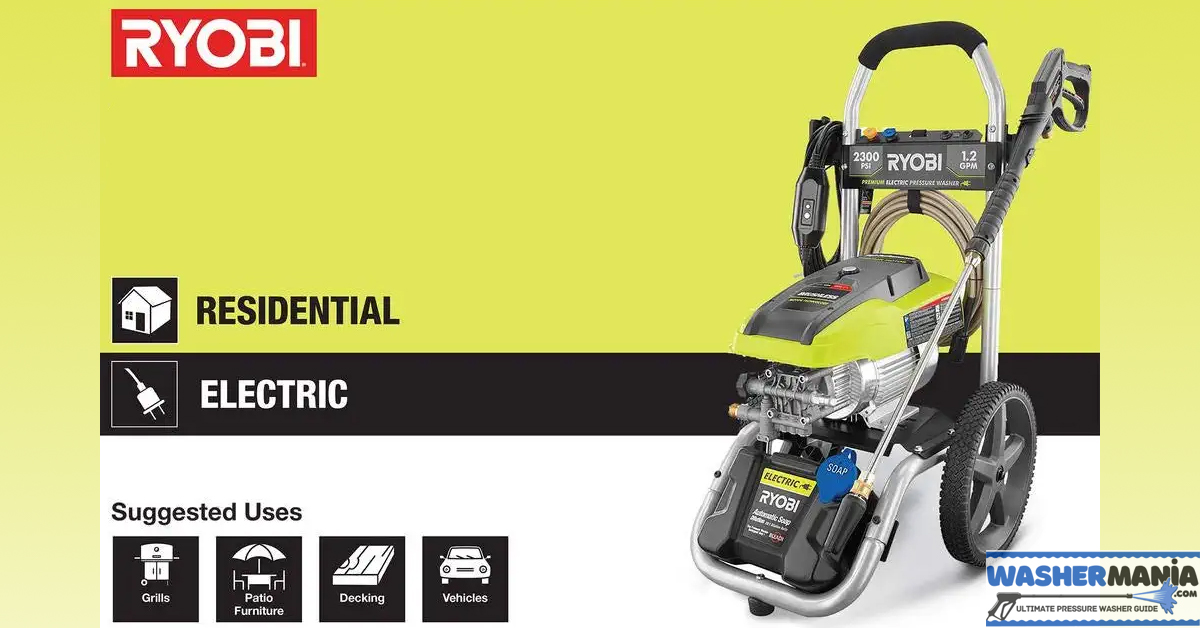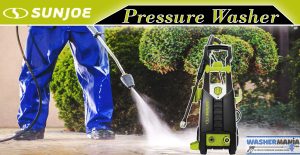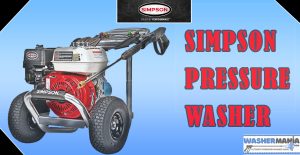Ryobi pressure washers are powerful machines because Ryobi is well known for manufacturing high quality power tools, and their line of pressure washers is no exception because of Ryobi’s commitment to making the best pressure washers possible. The Ryobi Pressure Washer comes in three different PSI levels depending on what kind of job you’re tackling: 1600–1800 PSI for general cleaning jobs around the house (like washing your car, boat, grill, or getting crud off your driveway); 2000–2300 PSI for your deck and patio furniture; and 2900–3600 PSI for driveways, farm equipment, graffiti removal, and paint stripping. All three versions are lightweight enough that even someone who’s not particularly strong can use them easily.
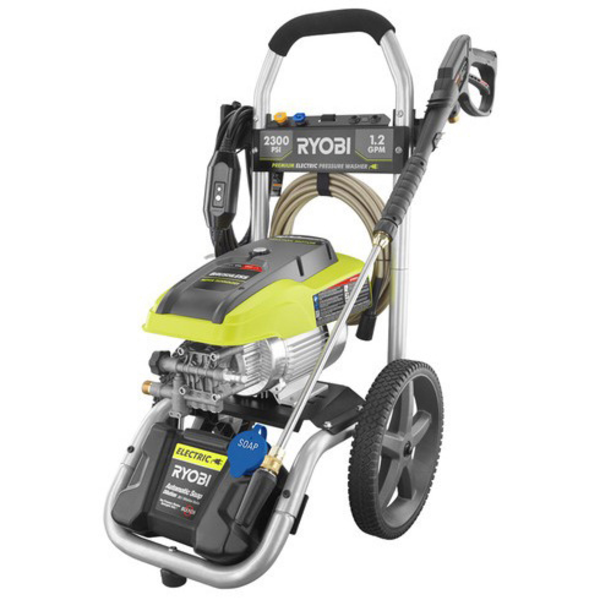
Best Ryobi Pressure Washers
It’s often difficult to choose which one will be the best fit for your individual needs. Thankfully, we’ve done all the work for you by compiling this list of the best Ryobi electric and gas pressure washers currently on the market. To know more about Ryobi Group click here. We’ll discuss how each one stacks up in terms of cleaning power, warranty, portability, ease of use, and more.
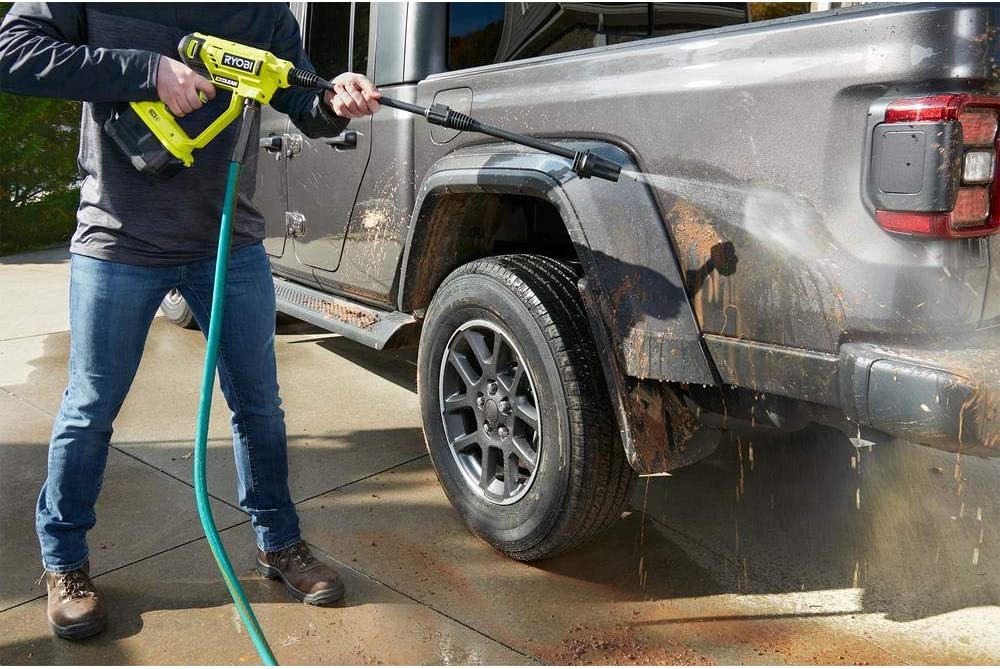
Ryobi’s powerful pressure washer machines provide enough pressure to easily cut through dirt and grime without having to spend hours scrubbing at your project like you would with a traditional hose and bucket setup. And because it uses less water than other methods, it’s eco-friendly too. Here are some of the best Ryobi pressure washers. Let’s get started!
Our Top Picks
Customers must pick from among the several pressure washers that Ryobi sells, some of which have similar features. Following an inspection of the available tools, we chose the models below as some of the best Ryobi pressure washers for particular applications since each one provides a fair range of adaptability and value within the category.
Top 5 Ryobi Pressure Washers
- Ryobi 3000-PSI Gas Pressure Washer
- RYOBI RY802900 Gas Pressure Washer
- RYOBI Electric Pressure Washer
- RYOBI RY141820VNM Electric Pressure Washer
- Ryobi RY141900 Electric Pressure Washer
1. Ryobi 3000-PSI Gas Pressure Washer
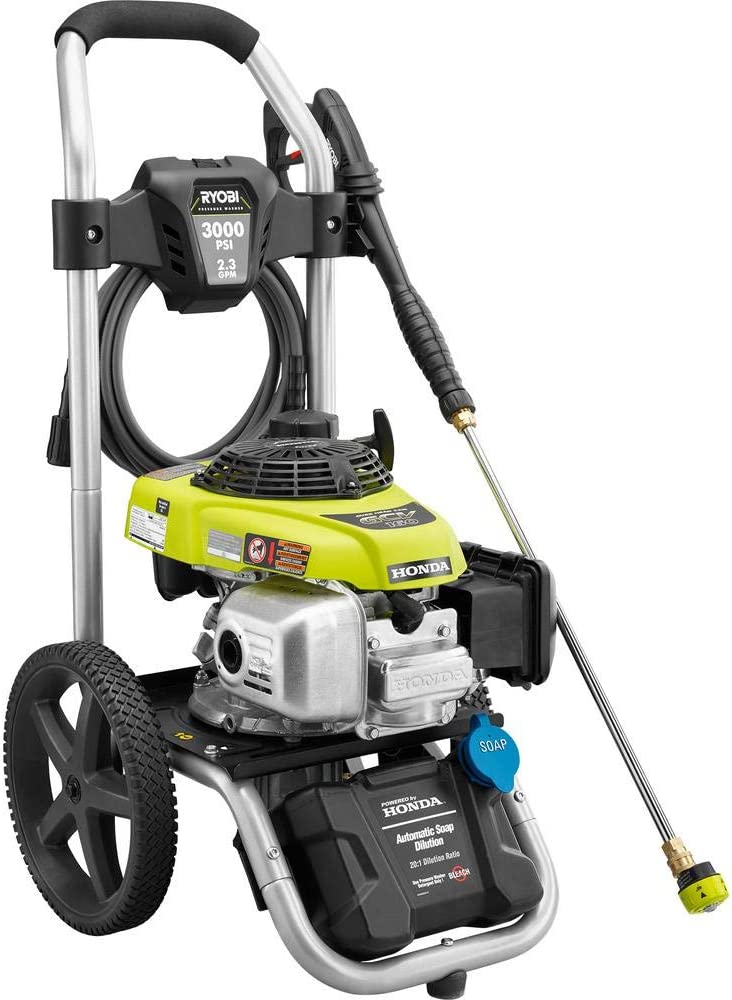
Ryobi 3000-PSI 2.3-GPM Honda Gas Pressure Washer
The Ryobi 3000-PSI Pressure Washer is engineered to handle even your toughest jobs. With a powerful Honda GCV160 gasoline engine, this Ryobi pressure washer delivers 3000-PSI of force for quick cleaning of driveways, decks, windows, and other areas around the house. This pressure washer is designed for easy transport. It features a durable, compact frame design and large 12 in. flat-free wheels. The 35 ft. non-marring high pressure hose provides 40% longer reach for access to even the toughest areas. The on-board detergent tank offers hassle-free cleaning by eliminating the need to drag a bucket and hose behind you. For added convenience, the Ryobi 3000-PSI Pressure Washer is equipped with a 5-in-1 quick-change-over nozzle for versatile cleaning.
Pros
- It is Extremely powerful
- Very easy to operate controls
- Easy to transport and store
- It works very fast
- Reasonably priced gas washer
- 3,000 PSI is powerful enough to carry out various residential tasks in half the time
Cons
- It is heavier & louder
- It needs fuel as well as maintenance
2. RYOBI RY802900 Gas Pressure Washer
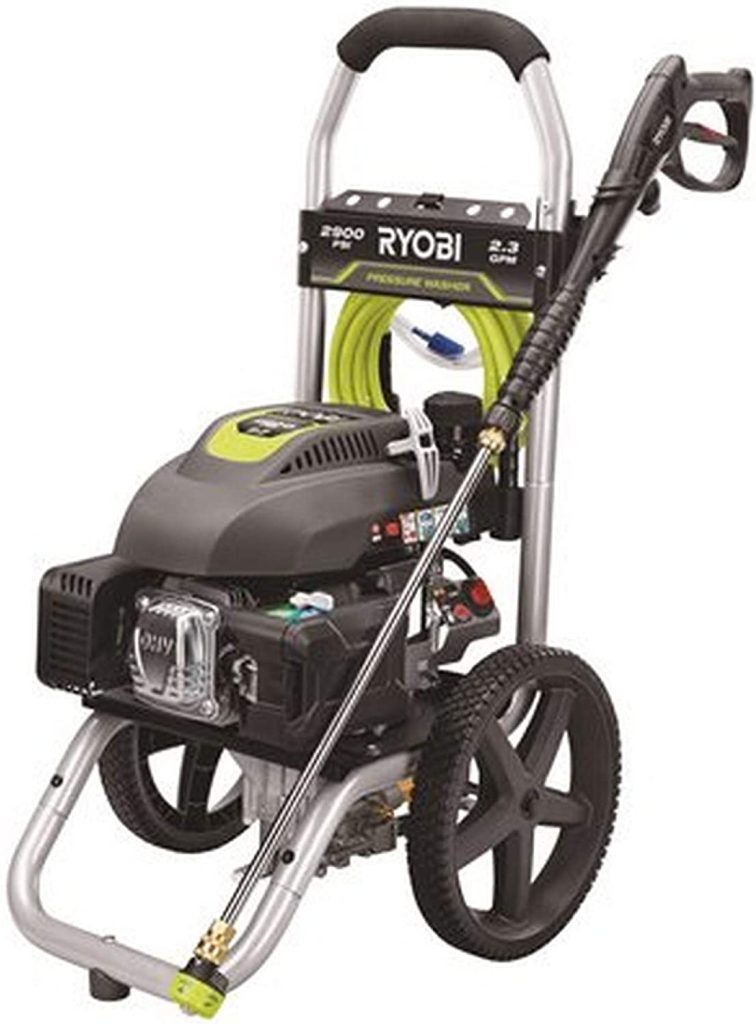
RYOBI RY802900 2900 POUNDS PER INCH Pressure Washer
The RYOBI 2900-PSI Pressure Washer is engineered to handle even your toughest jobs. With a powerful OHV 173 cc gasoline engine, this Ryobi pressure washer delivers 2900 PSI of force for quick cleaning of driveways, windows, and other areas around the house. This pressure washer is designed for easy transport. It features a compact frame design and large 12 in. flat-free wheels. The 35 ft. non-marring high pressure hose provides 40% longer reach for access to even the toughest areas. For added convenience, the RYOBI 2900 PSI Pressure Washer is equipped with a 5-in-1 quick-change-over nozzle for versatile cleaning. The RYOBI 2900-PSI Gas Pressure Washer is backed by the RYOBI 3-year limited warranty.
Pros
- It’s very Excellent water pressure and flow for medium and large projects
- It has 12-inch flat free wheels
- It also has 35 foot Pressure Hose
- It’s style is Hand-Truck-Style frame
Cons
- It’s Wheels are Narrow, hard are less mobile on rough ground
- It Requires fuel and regular gas engine maintenance
3. RYOBI Electric Pressure Washer
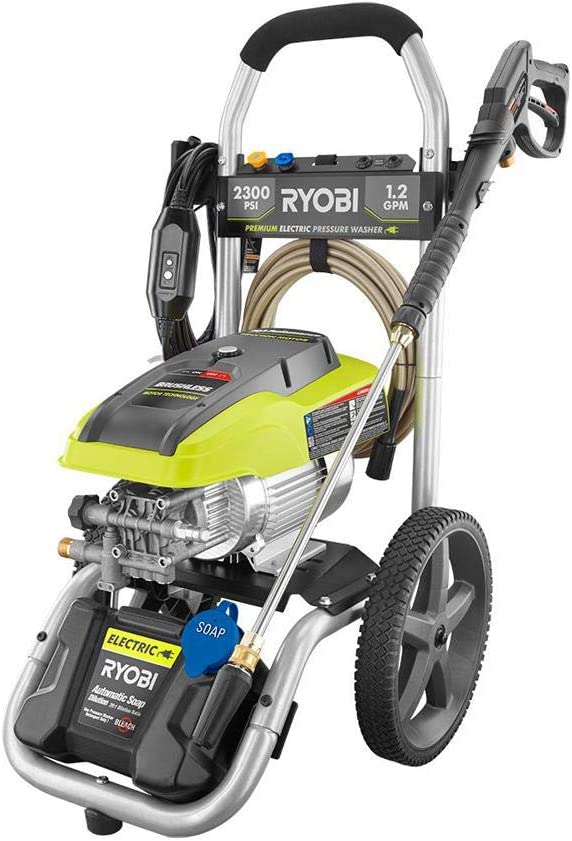
RYOBI 2,300 PSI 1.2 GPM High Performance Electric Pressure Washer Renewed
The RYOBI 2,300 PSI pressure washer is engineered to handle even your toughest jobs. This Ryobi pressure washer features a powerful 13 Amp High Efficiency Brushless Electric Induction Motor and Pressure Technology. With 2,300 PSI of force, it is exceptional for quick cleaning of driveways, decks, windows, patio furniture, and other areas around the house. This unit also includes a bonus Turbo Nozzle that delivers up to 50% more cleaning power.
The RYOBI 2,300 PSI Electric Pressure Washer is backed by the RYOBI 3-Year Limited Warranty and is guaranteed to deliver results for years to come. Performance tested and rated in accordance with PWMA standard PW101 2,300 PSI 1.2 GPM for powerful, efficient cleaning of residential areas with a powerful 13 Amp high performance brushless induction motor. The Turbo nozzle delivers 50% faster cleaning with a 25 ft. non-marring high pressure hose that will not leave scuffs on the job. Professional metal spray wand with quick-connect coupler for easy nozzle changes. On board accessory storage for user convenience and a full year of warranty.
Pros
- It is Rated and Tested by the PWMA’s PW101 specifications.
- It utilizes power of 2,300 PSI and 1.2 GPM for efficient cleaning
- It has a powerful 13-amp brushless motor.
- Turbo nozzle of this washer provides 50% speedy cleaning.
- A 25 foot non-marring hose does not leave marks on the task.
- Provides accessory storage for convenience.
Cons
- It comes with a variety of prices in the market but Home Depot offers higher prices compared to Amazon.
- It is best for machine to turn off the motor when not in use since the machine could easily get hot because of the recirculating water inside.
4. RYOBI RY141820VNM Electric Pressure Washer
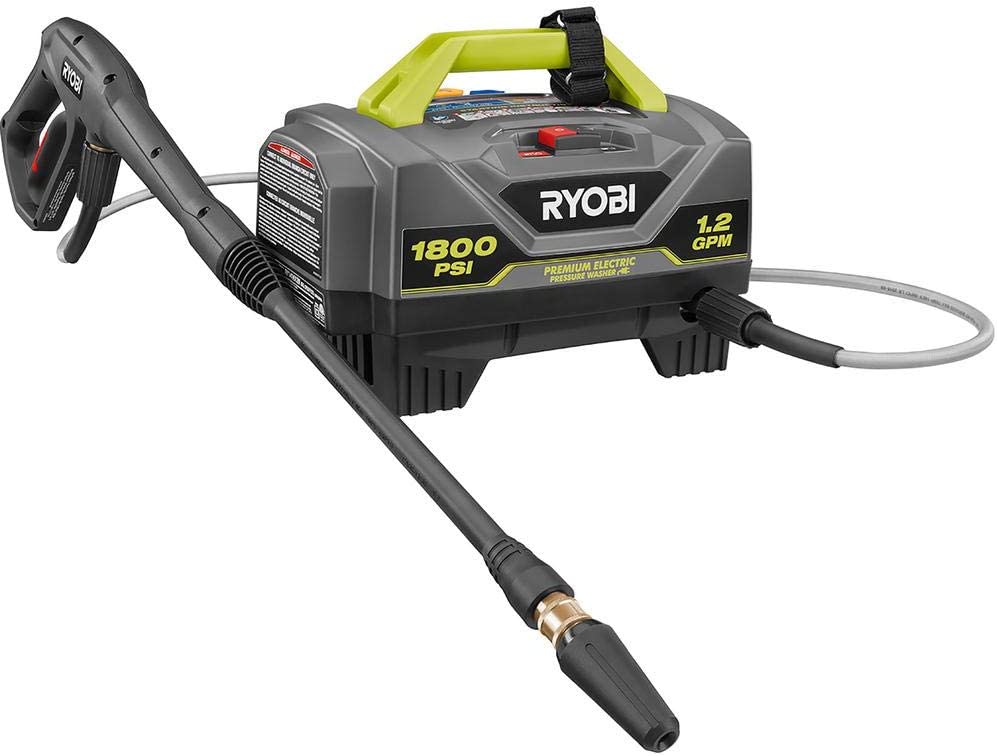
RYOBI 1,800 PSI 1.2 GPM Electric Pressure Washer, RY141820VNM
This RYOBI 1800 PSI Electric Pressure Washer is lightweight and compact, making it easy to move around your house. With its powerful 13-amp electric motor, this unit delivers 1800 PSI of force for quick cleaning of things like windows, decks, and patio furniture. There is no need to try and keep track of the three included nozzles, as they can be conveniently stored right on the unit. Use the included Turbo Nozzle for up to 50% more cleaning power. The RYOBI 1800 PSI Pressure Washer is backed by a 3-Year Limited Warranty.
Pros
- Compact and very easy to store
- Very Lightweight and easy to transport
- Excellent cleaning power for small tasks
- It Offers onboard detergent tank including accessory storage.
- Machine is small and can be stored vertically.
Cons
- It is not effective for larger projects
5. Ryobi RY141900 Electric Pressure Washer
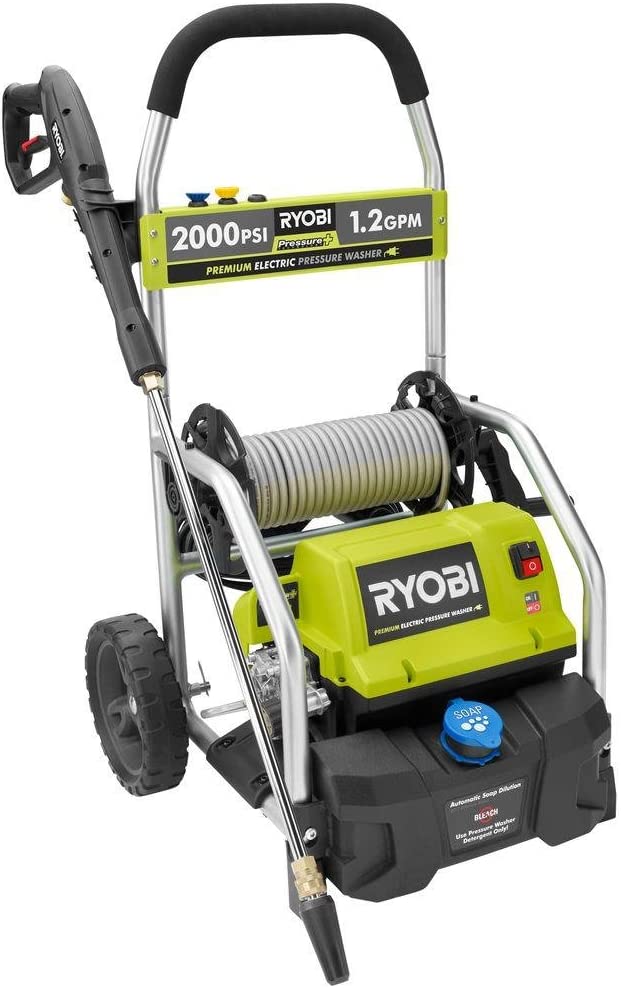
Ryobi RY141900 2,000-PSI 1.2 GPM Electric Pressure Washer
The RYOBI 2000 PSI Pressure Washer is engineered to handle even your toughest jobs. With a powerful 13-amp electric motor and pressure technology, it delivers 2000 psi of force for quick cleaning of driveways, decks, windows, and other areas around the house. Featuring a durable roll-cage frame design, this Ryobi pressure washer is built for easy transport.
A removable detergent tank offers easy soap application and hassle-free clean-up, and for added convenience, the unit is also equipped with an on-board hose reel and accessory storage. For an extra boost, the 3 nozzles include a bonus turbo nozzle that delivers up to 50% more cleaning power for tough jobs.
Pros
- This machine has a powerful electric motor of 13 amps.
- It offers 2400 Cleaning Power Units (CPU).
- It assembled on two wheels which makes it quite versatile.
- A spray gun, wand, pressure hose and a mode for detergent injection are included.
- It includes three additional nozzles: 15-degree nozzles, soap nozzles, and turbo nozzles.
- It is portable and convenient to use, making it a perfect option for longer intervals of cleaning.
- Casing is durable and safeguards the electric engine well.
Cons
- As an electric powered pressure washer, rusty and resistant residues that are not easily reached could not be washed so accessories like Ryobi surface cleaners in style are required.
- Wheels on the base appeared to be difficult to steer, it might not fit for properties with larger lot dimensions.
What are the things to consider when choosing the best Ryobi pressure washer?
It’s useful to have a way to focus the search when there are several models to pick from. When buying, the major features of pressure washers listed below might be useful.
Gas vs. Electric Pressure Washers
Compared to electric pressure washers, gas pressure washers provide more water pressure at a higher flow rate. Gas pressure washers are ideal for bigger, messier chores like washing fences, driveways, and house siding because of the fact that they don’t need to be connected to a power line.
At around half the gas flow rate, electric pressure washers usually provide somewhat less water pressure. Compared to their gas-powered predecessors, they are often more compact, lighter, quieter, and simpler to store. For cleaning common home items like vehicles, lawn mowers, patio furniture, driveways, or patios, electric pressure washers are a wonderful option.
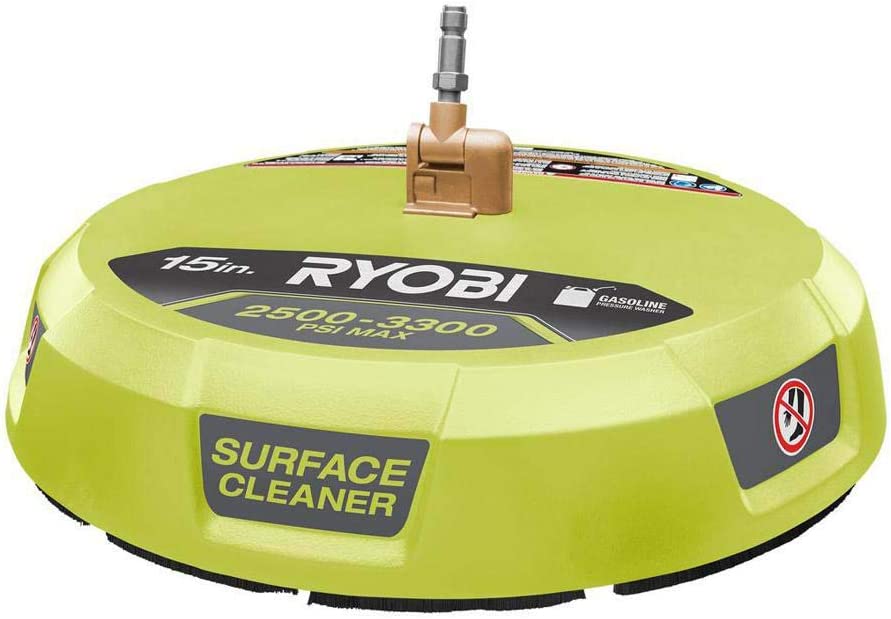
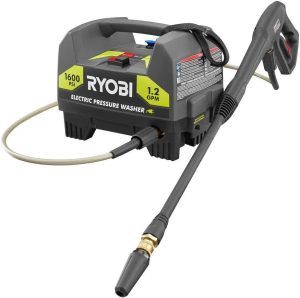
Targeted Purpose
Think about the pressure washer’s intended application before purchasing. Use the psi rating as a tool for evaluating a model’s capability to carry out the required duties. It is reasonable to use a more powerful pressure washer for a simpler job, but caution must be exercised to protect the material’s finish and surface. The most suitable pressure washer psi rating for each of the common household cleaning tasks includes:
- 1,500 psi for cars, bikes, and grills.
- 2,500 psi for decks and fences.
- 3,000 psi for house siding and driveway pavement.
- 4,000 psi for industrial cleaning and paint stripping.
Flow Rate
The flow rate and water pressure of a pressure washer are used to determine how effective it is in cleaning. The volume of water that flows through the machine at any particular moment is known as the flow rate and is measured in gallons per minute (GPM). A pressure washer’s power may be determined by looking at its GPM rating. Soil is removed from a surface twice as quickly when the flow is increased from 1.0 to 2.0 GPM.
PSI (Pounds per Square Inch)
Water pressure, which is the force of the water stream the washer produces, is expressed in pounds per square inch (psi). The PSI rating of a pressure washer reflects its capacity to remove debris that has become attached to a surface. The distance the operator can hold the spray tip from a surface increases as the water pressure is increased from 2,000 to 3,000 psi.
Spray Wand
Spray wands for pressure washers are not all the same. Typically, the trigger is either moulded or lever-style, and the spray gun’s body is made of plastic. The connections between the spray gun and pressure hose and between the spray gun and the wand can also be made of heavy-duty metal quick connectors or light-duty plastic parts.
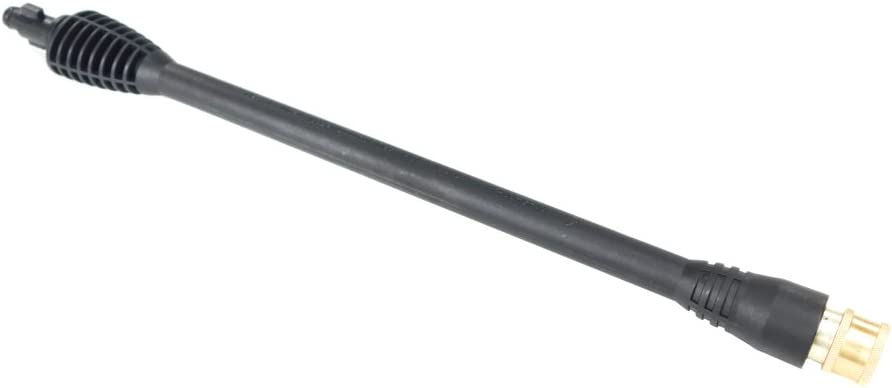
Plastic Parts
Plastic parts found in light-duty electric washers would not withstand the high pressure generated by heavy-duty machines. Entry-level devices frequently come with a plastic wand and an adjustable plastic spray tip. Premium pressure washers have spray wands made of stainless steel with brass fast connections for changing the spray tip.
Portability
There are several varieties of portable pressure washers. The washer’s overall size and weight, frame design, handle arrangement, and wheel type and size are important characteristics to look for. The smallest, lightest models resemble a large lunchbox or a small cooler in size. Since they are lightweight, small, and without wheels, they are simple to pick up and store.
Accessories
In addition to the main unit, pressure hose, and spray wand, accessories have an impact on the washer’s cleaning performance and ease. Changeable spray tips vary the spray pattern from a powerful narrow jet to a dispersed broad fan to accomplish different jobs. Cleaning with a turbo nozzle is up to 50% quicker than using a standard spray tip since it produces a narrow rotating stream.
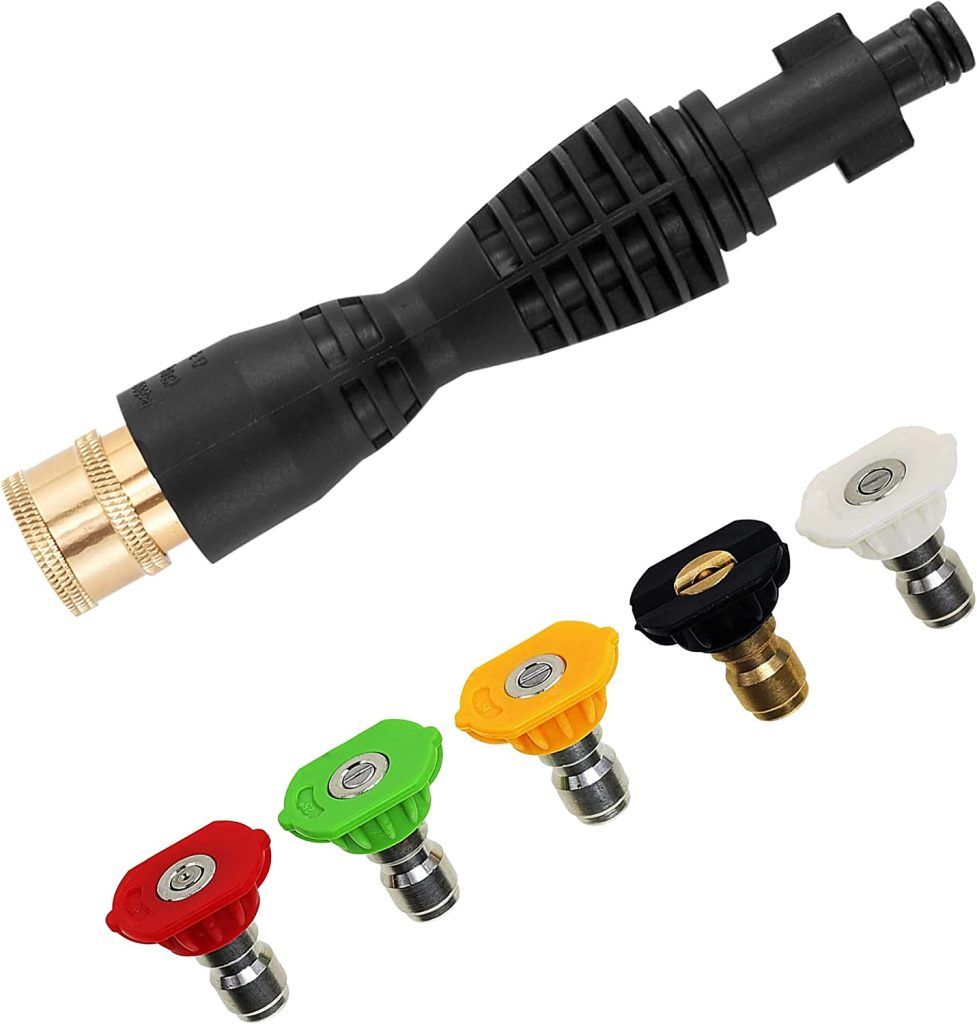
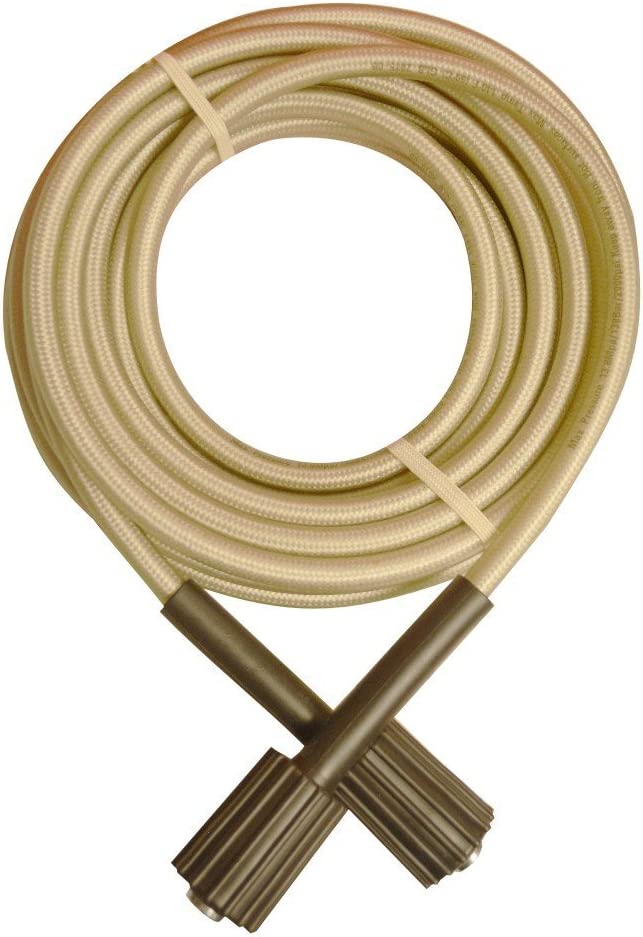
Frame
The majority of pressure washers feature a frame similar to a hand truck or wheelbarrow. Although a vertical hand-truck layout removes the majority of the user’s weight, it can be a little top-heavy. Although the wheelbarrow configuration can be quite stable because of its low centre of gravity, it also places greater weight on the person being transported.
Wheel Size and Type
The unit’s movement on varied surfaces is influenced by the wheel type and size. On firm, flat surfaces, rotating wheels make it simple to move in any direction. Large wheels with a diameter of 8 inches or more run smoothly across uneven ground. For navigating grassy, muddy, and other natural conditions, pneumatic tyres perform well. Moving a big, heavy model is made simpler and safer with a suitable handle height.
Foam Cannons
Cleansers are applied to surfaces using foam cannons and foam cannon soap tips so that they stick to the surface , soak in and remove debris. Surface cleaners, power brushes, a chemical nozzle kit, and more are just a few of the additional Ryobi pressure washer accessories that are available for separate purchase.
How we picked the best Ryobi pressure washers
It might be challenging to select from the several gas and electric Ryobi pressure washers available today. Based on the various sorts of tasks needed around the house, we examined and ranked some of the finest solutions.
We selected gas-powered heavy-and medium-duty versions with greater combined psi and GPM capacities. For light-to medium-duty cleaning activities where more potent gas machines risk damaging delicate surfaces, electric pressure washers thrive. A cost-effective, lightweight, small-footprint electric variant appropriate for storage areas and modest jobs was also offered. These models illustrate each category’s usefulness and worth.
Tips for Using a Ryobi Pressure Washer
Ryobi pressure washers are built to last and be simple to operate. Follow the machine’s assembly, operating, and maintenance instructions for the best results. The following are general best practices for cleaning with a pressure washer:
- Put the pressure washer in the center of the room.
- Unroll the pressure hose, straighten out any kinks, and join it to the sprayer and washer.
- Pick a spray tip, attach it to the end of the wand, and secure the trigger in the “off” position.
- Connect the power cord and, if necessary, the water supply.
- Add a pressure-washing solution to the soap tank (should have a water-like consistency).
- Turn on the pressure washer after turning on the water supply.
- After finishing, switch off the water supply and then the pressure washer.
- To store the pressure hose, disconnect it and empty it.
Other Popular Pressure Washer Brands
FAQs
When choosing the finest Ryobi pressure washer, buyers have a lot to think about, and each user may have different demands. As a result, concerns regarding owning or using a Ryobi pressure washer may persist. For further advice and solutions to some frequently asked issues regarding these technologies, continue reading.
How long is the lifetime of a Ryobi pressure washer?
A variety of pressure washers from Ryobi are available, each with unique features and parts. The hoses, connections, and pump are the components of equipment that fail due to wear and tear the most frequently. These appliances typically last 5 years or longer with typical use and maintenance.
What is a suitable pressure washer psi rating?
It’s crucial to match the task’s psi rating. Choose a pressure washer in the 1,000 to 2,500 psi range if the majority of the jobs you have in mind involve delicate painted or wood surfaces. Choose one with a pressure rating of 3,000 to 4,000 psi or greater for more forceful cleaning and paint removal.
What PSI of pressure should I use to clean my driveway?
Dirt and algae build up on asphalt and concrete driveways. Use a pressure washer with a minimum rating of 3,000 psi for the best results.
Which company makes the engines for Ryobi pressure washers?
Many of the gas engines used in Ryobi pressure washers are produced by Techtronic Industries, of which Ryobi is a division. Honda gas engines are found in several high end Ryobi models.
What kind of gas do you put in a Ryobi pressure washer?
Ryobi gas pressure washers use 87-octane normal unleaded gas with a maximum ethanol content of 15%.
Does my pressure washer require fuel stabiliser?
If fuel is going to be kept for more than a week or so, fuel stabiliser is advantageous to the engine. For storage of two weeks to six months, add fuel stabiliser. Drain the gasoline for storage if the washer won’t be used for more than six months.
Are Ryobi pressure washers adjustable?
Changing the spray tip of a Ryobi pressure washer will alter the pressure and spray pattern. For typical spray tips, the narrower the fan pattern and the greater the pressure, the lower the “degrees” rating. A five-in-one spray nozzle may be configured by simply turning it in the desired direction.

